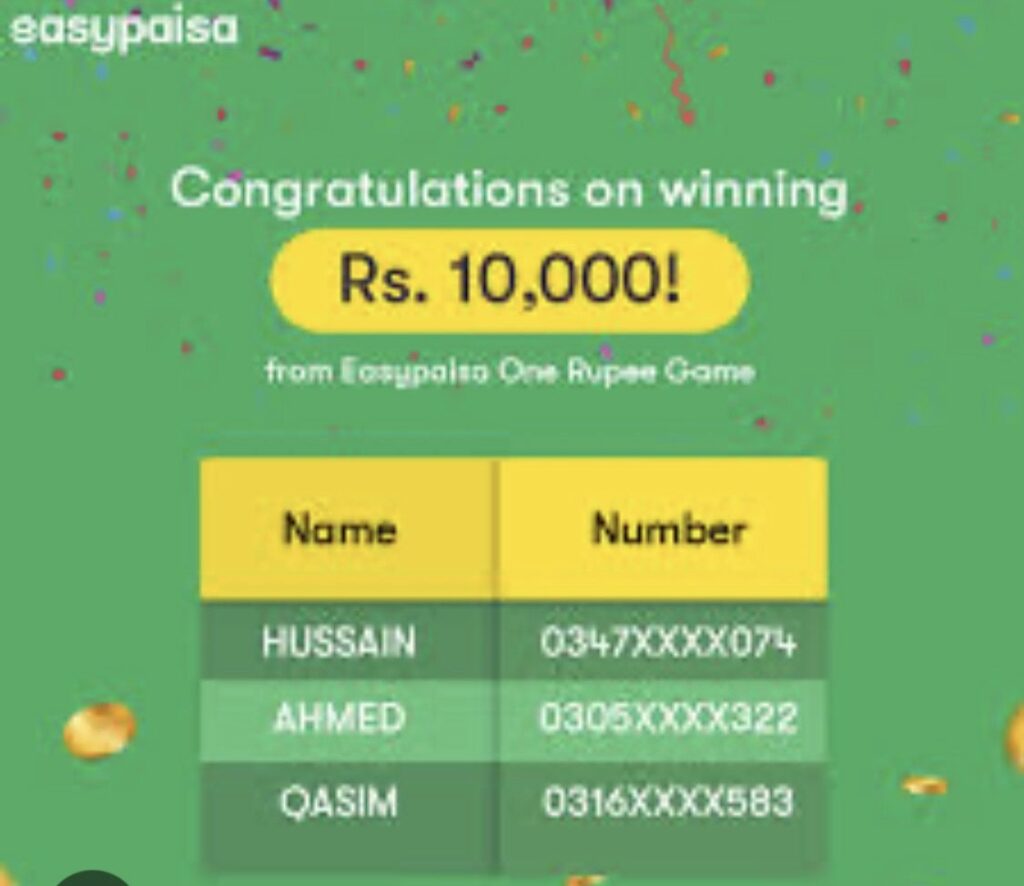Easypaisa, one of Pakistan’s leading digital payment platforms, has introduced a 1 Rupee game that has caught the attention of many users. On the surface, this game appears harmless—a mere 1 rupee is all it takes to participate, making it seem like an insignificant amount. However, a deeper look reveals a practice that raises significant ethical concerns and calls for a more transparent approach.
The Illusion of Insignificance

The genius—and the problem—of the 1 Rupee game lies in the amount itself. One rupee is an amount so small that it barely registers in the minds of consumers. It’s a tiny drop in the ocean for each individual, but when collected en masse, it becomes a substantial pool of money that Easypaisa can use for its own banking services and investments. The very fact that people are willing to part with this amount without a second thought is a testament to how easily the company can accumulate vast sums with little to no resistance.
Banking on the Masses
Easypaisa is essentially leveraging the power of numbers. By collecting small amounts from millions of users, they amass a large fund that can be reinvested in various financial services. The return on these investments is likely many times greater than the prize amounts they offer to a few lucky winners. This raises a critical ethical question: Is it fair for Easypaisa to generate significant profits from these microtransactions while giving back only a fraction of it? The answer, to many, might seem clearly unethical.

The core issue is that the game is framed as a harmless, fun activity, but in reality, it is a cleverly disguised mechanism for capital accumulation. While Easypaisa is not breaking any laws by doing this, the moral implications are questionable at best. The game preys on the collective disregard for small amounts of money, using it to bolster its own financial standing.
The Misleading Language: “Purchased” Items
One of the most problematic aspects of the 1 Rupee game is the use of the term “purchased” when someone pays to participate. The word “purchase” implies that the buyer is receiving something tangible or at least something guaranteed in return. However, in the context of this game, nothing is actually being “purchased.” Users are essentially buying a chance to win a prize, but that chance is not a product—it’s a gamble.

Ethically, Easypaisa should not be allowed to use the word “purchased” in this context because it is misleading. If a customer is said to have “purchased” something, they should receive that item or service. In this case, the only thing being delivered is a hope—a slim chance of winning a prize. The misleading terminology could be seen as a deliberate attempt to obscure the true nature of the transaction, which further erodes trust in the platform.
A Call for Transparency and Ethical Practices
Easypaisa needs to rethink its approach to the 1 Rupee game. First and foremost, the language used in the app should be clear and honest. Instead of saying that users have “purchased” something, the platform should transparently communicate that users are paying for a chance to win, with no guarantee of receiving anything in return. This would align their practices with ethical standards and restore some degree of trust among users.

Moreover, the entire operation of the 1 Rupee game needs to be more transparent. Easypaisa should disclose how the funds collected are being used and provide a clear breakdown of how much of that money goes toward prizes versus how much is reinvested or used for other financial gains. Without such transparency, users are left in the dark, contributing their money to a system that they do not fully understand.
While Easypaisa is widely recognized as a reliable banking solution in Pakistan, its 1 Rupee Game has come under scrutiny for lacking transparency. Despite being a popular promotional game, there has been a noticeable absence of publicized winners or detailed information about the game’s outcomes. This lack of visibility raises concerns about the fairness and credibility of the game. To enhance trust and ensure that participants feel valued, Easypaisa should take proactive steps to bring transparency to the 1 Rupee Game. This could involve publicly highlighting winners, providing clear details about the selection process, and implementing measures to verify the integrity of the game. By doing so, Easypaisa would not only strengthen its reputation as a trustworthy platform but also foster greater engagement and confidence among its users.


Leave a Comment